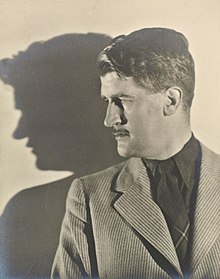Denis Johnston
"Passionate in his radical scepticism and loathing of what he saw as the pernicious influence of the Roman Catholic Church",[3] at the end of 1933, Johnston joined the trade unionist John Swift, the Dublin novelist Mary Manning, and fellow northerner, the socialist Jack White, in forming The Secular Society of Ireland.[4] "Convinced that clerical domination in the community is harmful to advance", the society sought "to establish in this country complete freedom of thought, speech and publication, liberty for mind, in the widest toleration compatible with orderly progress and rational conduct".[4] Johnston had become a recognised man of the left: in 1930 he had joined the Irish Friends of Soviet Russia, and though never a party member, until as late as the 1950s he professed faith in a communist future.He kept extensive diaries throughout his life, now deposited in the Library of Trinity College, Dublin, and these together with his many articles and essays give a distinctive picture of his times and the people he knew."[11] Set in 1927 during an attempt by the IRA to destroy an Irish Free State government power plant, a later New York Times review of the play's 1961 revival noted an "exhilaratingly mad, comic strain."."[15] In a profile in the New Yorker in 1938, Clifford Odets is quoted as saying that the only playwrights he admired were John Howard Lawson, Sean O’Casey, and Denis Johnston.A travel guide written by Harvard students in introducing Dublin made a classic misattribution: "James Joyce loved his 'Strumpet city in the sunset'".

Denis JohnsonDennis Johnson (disambiguation)war correspondenceDublinJonathan Swiftwar correspondentGate TheatreJames MasonJack HawkinsClaude RainsBarry FitzgeraldJames CocoErrol FlynnWilliam John JohnstonMagherafeltPresbyterianshome rulersSt Andrew's College, DublinMerchiston Castle School, Edinburgh (1915–16).Sinn FéinOfficer Training CorpsChrist's College, Cambridgecivil-warFree State armyHarvard Law SchoolKing's Inns (Dublin)Inner Temple (London)Seán O'CaseyJohn SwiftMary ManningJack WhiteThe FreethinkerSpanish RepublicSoviet Russiaparty memberSecond World WarEl AlameinItalian campaignBuchenwaldBerghofMention in DespatchesMount Holyoke CollegeSmith CollegeLibraryTrinity College, DublinUlster University at ColeraineUniversity of UlsterAosdánaShelah RichardsJennifer JohnstonBetty ChancellorHilton EdwardsThe New York TimesBrooks AtkinsonIrish Free StateIrish SenateDenis IrelandAnglo-IrishWorld Book EncyclopediaNew YorkerClifford OdetsJohn Howard LawsonJames PlunkettStrumpet CityCarol SobieskiErnst TollerSix Characters in Search of an AuthorNine Rivers from JordanPirandelloGuests of the NationRiders to the SeaOurselves AloneLibrary of Trinity College Dublin